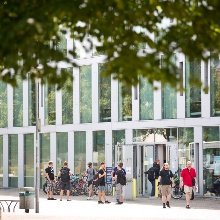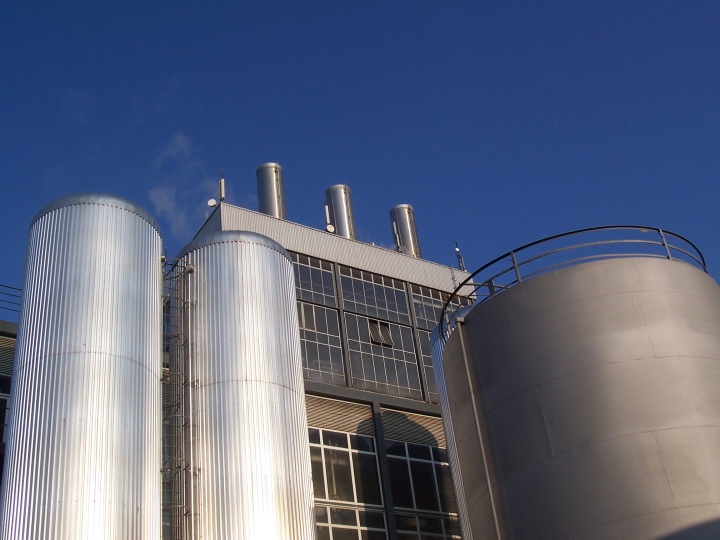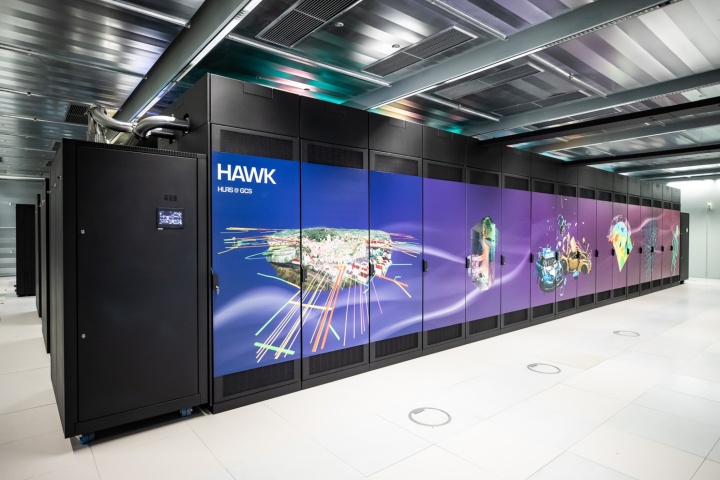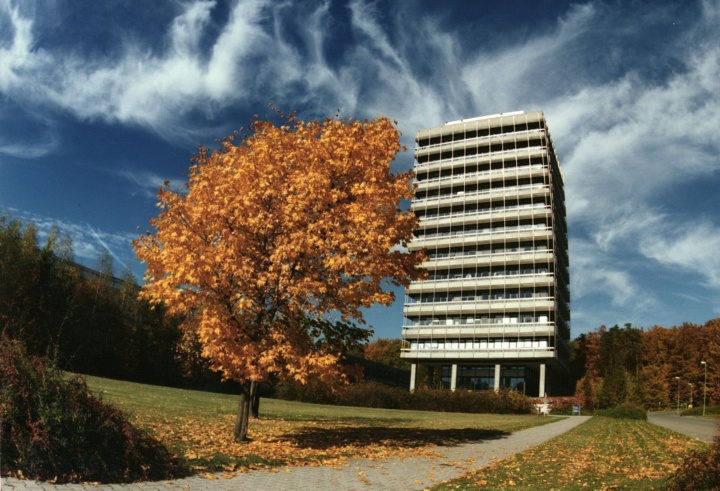Central Facilities
Central Facilities with their service offerings support above all the students and staff of the University of Stuttgart. Whether it is the University Library, the Combined Heat and Power Plant, or Continuing Education, Central Facilities perform research, training, service and provisioning functions.
GRADUS is the main service center for for young researchers of all academic disciplines at the University of Stuttgart, offering a wide range of qualification, counselling and mentoring programs.
Since 1959, the University of Stuttgart operates its own heating and power plant (HKW) on the Vaihingen campus from which it supplies, besides the University's own research facilities, also five student dormitories with about 3,000 student apartments.
The High Performance Computing Center (Höchstleistungsrechenzentrum, HLRS) conducts basic and applied research in the field of high-performance computing in publicly funded national and European projects as well as industrial research activities in association with partners from research and industry. The "Hawk" supercomputer at HLRS is one of the fastest computers in the world.
The University of Stuttgart Information and Communication Center (IZUS) is a one-stop shop for meeting the university's information and IT services requirements. It is split into two areas: University Library, and Technical Information and Communications Service [de].
The Master:Online Academy [de] offers a study-while-working continuing education for individuals who have already earned a professional qualifying university degree and have at least one year of on-the-job experience.
As a technical services provider, the Stuttgart Materials Testing Institute is a competent partner for industry. In addition, the MPA carries out experimental studies for university institutes and makes its technical facilities available for student training.
The MINT College facility exists to improve specialized technical knowledge in the MINT subjects (mathematics, computer sciences, natural sciences, technology) during the transition from secondary school to university course work.
The Language Center offers a broad spectrum of differentiated course programs in 16 foreign languages including German as a second language.
The Visualization Institute (VISUS) is a central research facility of the University of Stuttgart. Three work groups conduct fundamental research on scientific visualization processes, as well as interdisciplinary, application-oriented research in close team work with other subject specialties of the University of Stuttgart.
The Center for Higher Education and Lifelong Learning [de] is dedicated to subjects of interdisciplinary university education, of lifelong learning and academic career and organizational development in the field of teaching and management.
Inter-faculty teaching facilities
The University of Stuttgart brings together highly motivated staff members, outstanding teachers, excellent researchers and visionary inventors. Through this culture of integration, itit creates and disseminates knowledge for responsibly designing the future of our society.
Inter-faculty research facilites
Besides research in the disciplines, the University sees a great opportunity for new discoveries by engaging in interdisciplinary collaboration. By integrating different topical and methodological approaches to knowledge in complementary subject disciplines, as well as by bringing in the expertise of external partners, the special „Stuttgarter Weg” (Stuttgart Way) represents a cogent contribution to answering the challenging questions of our times. The continued interlinking all areas within the University (e.g., in the form of research centers) therefore is given special priority.
- Collaborative Research Centers and Transregios
- Stuttgart Research Focus Language and Cognition (SRF)
- International Center for Culture and Technology Research (IZKT)
- Stuttgart Research Center Systems Biology (SRCSB)
- Stuttgart Research Center of Photonic Engineering (SCoPE)
- Stuttgart Research Center for Text Studies (SRCTS) [de]
- Stuttgart Research Center for Complex Systems and Communication (SR3C)
- Center for Applied Quantum Technology (ZAQuant)
- Center for Interdisciplinary Risk and Innovation Research (ZIRIUS)
- Center for Medical Technology Stuttgart Tübingen (IZST) [de]
- Center for Integrated Quantum Science and Technology (IQST)
- Advanced Materials Innovation and Characterization (AMICA)
- Work Group Air Pollution Control (ALS)
- Research Focus Traffic (FOVUS)
- Stuttgart Computer Science Association (IVS) [de]
- Stuttgart Center for Manufacturing Technologies (PZS)
- Project StutCAD (Faculty 7) [de]
- Center for Water Research Stuttgart (wfz)
- Research Cluster Wind Energy (WindForS)
InnovationCampus Future Mobility (ICM)
The transport systems and production techniques of the future need to be sustainable and efficient. This will require breakthrough technologies – from innovative vehicle drives to versatile production processes. The goal of the InnovationCampus Future Mobility (ICM) is to shape this change. In the ICM, the University of Stuttgart is combining its world class research and innovation teams with those of Karlsruhe Institute of Technology (KIT) to develop new technologies quickly and flexibly, testing new approaches, and creating the basis for a wide range of innovations.
Stuttgart Center for Simulation Science (SC SimTech)
Computer-aided simulation and modeling are penetrating all areas of science and increasingly also find application in industry and in daily life. The Excellence Cluster Data-Integrated Simulation Science (SimTech) investigates ways of improving modulation, display, calculation and application techniques as well as the infrastructure required for a broad spectrum of simulation applications.
ARENA 2036
The ARENA2036 Research Campus (Active Research Environment for the Next Generation of Automobiles) bundles expertise in lightweight construction and innovative manufacturing technologies prevalent in the Stuttgart region. In so doing, ARENA2036 builds bridges between R & D, science, and business. In tight-knit, open partnership, numerous institutes and firms are refining the path to the automobile and lightweight manufacturing of the future.
Facilities near and far
The University of Stuttgart initiates and supports joint projects and inter-faculty research centers and creates the required infrastructure for cooperative research undertakings. It intensifies its relationships with universities and non-university research facilities as well as with partners from regional businesses and society, both in our state and globally. The University maintains especially close relationships with non-university research institutes such as the Max Planck Society, the Fraunhofer Institute, the German Aerospace Center or the Marbach Literature Archive.
Fraunhofer Institutes
- Work and Organization (IAO)
- Building Physics (IBP)
- Chemical Technology (ICT)
- Interfacial and Bioprocess Engineering (IGB)
- Production Engineering and Automation (IPA)
Institutes of the Baden-Württemberg Innovation Alliance (innBW)
- German Institues of Textile and Fiber Research Denkendorf (DITF)
Institute of Textile Chemistry and Chemical Fibers (ITCF)
Institute of Textile Technology and Process Engineering
Center of Management Research - Institute of Micro Assembly Technology (HSG-IMAT)
- Institute of Micro and Information Technology (HSG-IMIT)
- Institute of Microelectronics Stuttgart (IMS), Foundation under the Civil Code
- Center for Solar Energy and Hydrogen Research Baden-Württemberg (ZSW))
Max Planck Institutes









